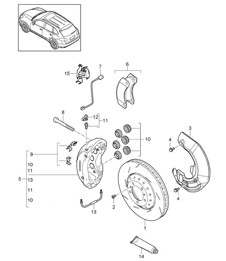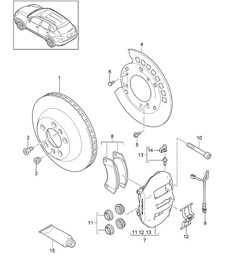Brake Disc Standard

Fits rear left or right. Sold as EACH

Porsche Cayenne (955) V8 4.5L TURBO S REAR
Porsche Cayenne (958) V8 4.8L TURBO REAR
*For cars with 457mm/18" disc and RED calipers
option code: I1KP or I1KU
Brake disc rotors are priced each.
Please note: OE brake discs and brake pads are not stocked items and fall under special order terms.
Related reference numbers
Related, superseded, cross reference or alternative numbers for comparison.
95835240150
The product you are viewing cross references to these numbers
- Porsche Cayenne Turbo S 4.5L 2006>>
- Porsche Cayenne Turbo V8 4.8L Petrol 500HP
- Porsche Cayenne Turbo S V8 4.8L Petrol 550HP
 Shop Securely
Shop Securely
 12 Month Warranty
12 Month Warranty
 Worldwide Delivery
Worldwide Delivery


Porsche Cayenne (958) V8 4.8L TURBO FRONT
For cars with 482mm/19" disc and RED calipers
*option code: I1LH
Brake disc rotors are priced each.
Please note: OE brake discs and brake pads are not stocked items and fall under special order terms.
Related reference numbers
Related, superseded, cross reference or alternative numbers for comparison.
95835140
The product you are viewing cross references to these numbers
- Porsche Cayenne Turbo V8 4.8L Petrol 500HP
- Porsche Cayenne Turbo S V8 4.8L Petrol 550HP
 Shop Securely
Shop Securely
 12 Month Warranty
12 Month Warranty
 Worldwide Delivery
Worldwide Delivery

Porsche Cayenne (958) V8 4.8L TURBO FRONT
Porsche Cayenne (958) V6 3.6L GTS FRONT
For cars with 482mm/19" disc and RED calipers
*option code: I1LH
Note: Brake disc rotors are priced each.
Related reference numbers
Related, superseded, cross reference or alternative numbers for comparison.
95835140
The product you are viewing cross references to these numbers
- Porsche Cayenne V6 3.6L Petrol 300Hp
- Porsche Cayenne Turbo V8 4.8L Petrol 500HP
- Porsche Cayenne Turbo S V8 4.8L Petrol 550HP
 Shop Securely
Shop Securely
 12 Month Warranty
12 Month Warranty
 Worldwide Delivery
Worldwide Delivery
Sold as EACH. fits rear left or right.

Porsche Cayenne (955) V8 4.5L TURBO S REAR
Porsche Cayenne (957) V8 4.8L TURBO REAR
Porsche Cayenne (957) V8 4.8L TURBO S REAR
Porsche Cayenne (958) V8 4.8L TURBO REAR
*For cars with 457mm/18" disc and RED calipers
option code: I1KP or I1KU
Diameter (Diameter): 358 mm
Overall height: 73,5 mm
Centring diameter : 85 mm
Number of holes: 5
Thickness: 28 mm
Minimum thickness: 26 mm
Tightening torque: 160 Nm
Brake disc rotors are priced each.
Related reference numbers
Related, superseded, cross reference or alternative numbers for comparison.
95835240150BRE
The product you are viewing cross references to these numbers
- Porsche Cayenne Turbo S 4.5L 2006>>
- Porsche Cayenne Turbo / Turbo S 4.8L 2007-10
- Porsche Cayenne Turbo V8 4.8L Petrol 500HP
- Porsche Cayenne Turbo S V8 4.8L Petrol 550HP
 Shop Securely
Shop Securely
 12 Month Warranty
12 Month Warranty
 Worldwide Delivery
Worldwide Delivery
Externally Vented, Coated
Outer diameter: 358 mm
Brake Disc Thickness: 28 mm
Bolt Hole Circle Ø: 130 mm
Centering Diameter: 85 mm
Weight: 9.8 kg
Hole Pitch / Number: 7/5

Porsche Cayenne (955) V8 4.5L TURBO S REAR
Porsche Cayenne (958) V8 4.8L TURBO REAR
** For cars with 457mm/18" disc and RED calipers
option code: I1KP or I1KU
Please note: discs are not sided. They fit left or right side of the car. Brake disc rotors are priced each.
Description:
All the brake discs and brake drums in Zimmermann standard range of wearing parts are manufactured in dimensions and to a material quality specified by the automotive manufacturers.
Your advantages:
• Equivalent spare parts as defined by motor vehicle block exemption regulation KFZ-GVO (EU) 330/2010
• Consistently high product quality
• Wide range of Standard Brake Discs with anti-corrosion protection Coat Z
• Over 50 years experience in brake disc manufacture
Related reference numbers
Related, superseded, cross reference or alternative numbers for comparison.
95835240150ZIM
The product you are viewing cross references to these numbers
- Porsche Cayenne Turbo S 4.5L 2006>>
- Porsche Cayenne Turbo V8 4.8L Petrol 500HP
- Porsche Cayenne Turbo S V8 4.8L Petrol 550HP
 Shop Securely
Shop Securely
 12 Month Warranty
12 Month Warranty
 Worldwide Delivery
Worldwide Delivery


Porsche Cayenne (955) V8 4.5L TURBO S REAR
Porsche Cayenne (958) V8 4.8L TURBO REAR
Porsche Cayenne (958) V6 3.6L GTS REAR
*For cars with 457mm/18" disc and RED calipers
option code: I1KP or I1KU
Brake disc rotors are priced each.
Related reference numbers
Related, superseded, cross reference or alternative numbers for comparison.
95835240150SEB
The product you are viewing cross references to these numbers
- Porsche Cayenne Turbo S 4.5L 2006>>
- Porsche Cayenne V6 3.6L Petrol 300Hp
- Porsche Cayenne Turbo V8 4.8L Petrol 500HP
- Porsche Cayenne Turbo S V8 4.8L Petrol 550HP
 Shop Securely
Shop Securely
 12 Month Warranty
12 Month Warranty
 Worldwide Delivery
Worldwide Delivery

For brake systems and is highly temperature-resistant (up to 1,000°C).
Available in 75ml tube and 5ml sachet
The advantages of Cera Tec:
• Non-conductive and contains no solids
• Suitable for ABS
• Facilitates brake installation
• Reduces brake squealing
• Protects against scoring and corrosion
• Free of copper and acids
• Pressure-resistant / high viscosity
Cera Tec is also suitable for lubricating:• Disc- and drum-brake systems
• Compressors
• Centralised lubrication systems
• Axle bearings
• Chains
• Seat rails
• Sunroof tracks
• Battery terminals
Application:
Apply a thin layer of Cera Tec on the marked sections
Find out about Textar product verification here
 Shop Securely
Shop Securely
 12 Month Warranty
12 Month Warranty
 Worldwide Delivery
Worldwide Delivery

• brake, clutch and gear components
• starter motors and alternators
• carburetors, fuel pumps and engine components
• glass and metal surfaces before gluing
The advantages of Textar brake cleaner:
• does not destroy polystyrene
• does not contain any chlorinated solvents
• is listed with the German Federal Ministry for the EnvironmentHow to use:
Spray a thick coating on the parts to be cleaned. Allow the solvent to drip and/or evaporate. Repeat if necessary.
Find out about Textar product verification here
Related reference numbers
Related, superseded, cross reference or alternative numbers for comparison.
96000100
The product you are viewing cross references to these numbers
 Shop Securely
Shop Securely
 12 Month Warranty
12 Month Warranty
 Worldwide Delivery
Worldwide Delivery
1. What Are Brake Discs?
Brake discs, also known as brake rotors, are circular metal components attached to your Porsche’s wheel hub. When you press the brake pedal, the brake calipers squeeze brake pads against the disc, generating friction that slows or stops the vehicle. This process converts the vehicle's kinetic energy into heat energy, which is then dissipated into the air. Why are Porsche brakes so good? Porsche has been transferring technology from their race cars into everyday cars. Top end engineering implemented to the cars on your driveway.
2. How can you tell if your brake discs are worn?
You will feel noticeable vibrations or pulsating when
breaking. Car will make unusual noises like squealing or grinding. Your Porsche
will take longer to stop. You can see the cracks on the surface or uneven wear.
3. Materials Used in Brake Discs on Porsche’s
Brake discs are made from various materials, each offering
unique benefits:
- Cast
Iron:
o Most Common Material: Durable, cost-effective, and provides excellent heat resistance.
o Drawback: Heavy, which can impact fuel efficiency and handling.
- High-Carbon
Steel:
o A
premium variant of cast iron that incorporates additional carbon for better
thermal resistance and reduced noise or vibration.
- Carbon-Ceramic
known as PCCB:
o Used
in high-performance sports cars and racing.
o Advantages:
Extremely lightweight (upto 50% lighter over steel discs), excellent heat
dissipation, and can withstand extreme temperatures without warping.
o Disadvantages:
Expensive, on average x15 more than cast-iron discs. Can be prone to damage in
everyday driving conditions. Brake feel is not so good if the brakes are not
heated up to required temperature.
o There
are few options if your car was equipped with Ceramics from factory, several
manufacturers are now offering cast iron replacements so you can enjoy your car
without breaking the bank.
- Porsche
Surface Coated Brakes (PSCB):
Porsche is claiming to be a pioneer in the market and first to use this technology. (tungsten-carbide coat same as used on drilling tools).
Mirror-like finish, low dust production, less brake fade, longer service life by around 30%, rust proof surface. Porsche has released these discs on larger models like Cayenne’s and Macan’s. Perform great from cold. Price is approx x5 of the cast-iron discs.
4. Functions of Brake Discs
Brake discs are integral to vehicle safety, with the
following primary functions:
- Friction
Generation: The brake pads press against the disc to create friction
and slow the vehicle.
- Heat
Dissipation: Brake discs are designed to dissipate heat effectively to
prevent brake fade, which occurs when brakes lose effectiveness due to
overheating.
- Structural
Stability: Brake discs must maintain their shape and performance under
extreme stress and high temperatures.
5. Variants of Iron Brake Discs
There are several types of brake discs, each suited to
specific applications:
a. Solid Discs
- Description:
Plain, flat discs with no special features.
- Use
Case: Typically found on early Porsches.
- Advantages:
Affordable and reliable for everyday driving.
- Disadvantages:
Limited heat dissipation, making them less effective under high-stress
conditions.
b. Ventilated Discs
- Description:
Feature internal vents or channels between two solid surfaces.
- Use
Case: Commonly used in all Porsches from 1970s onwards.
- Advantages:
Improved cooling and reduced brake fade during heavy braking.
c. Drilled Discs
- Description:
Have holes drilled into the surface.
- Advantages:
Better heat dissipation and water evacuation, reducing the risk of fading
or poor performance in wet conditions.
- Disadvantages:
The drilled holes can weaken the disc structure, making them prone to
cracking under extreme stress. This has been overexaggerated amongst the
community and steers people towards slotted discs as an alternative.
d. Slotted or Grooved Discs
- Description:
Feature machined grooves or slots on the surface.
- Advantages:
Enhances pad bite and removes debris or gas buildup between the pad and
disc.
- Disadvantages:
Can wear down brake pads faster than other designs.
e. Drilled / Dimpled and Slotted Discs
- Description:
Combine both drilled holes and slots.
- Advantages:
Combines benefits of both drilled and slotted discs, offering excellent
heat dissipation and pad bite.
6. Choosing the Right Brake Discs
The right brake disc depends on your vehicle type and how
you use it:
- Daily
Commuting: Solid or ventilated discs made of cast iron are sufficient
for reliability and cost-effectiveness.
- Performance
Driving: Drilled or slotted discs made from high-carbon steel or
carbon-composite materials for superior performance.
- Luxury
or Racing Applications: Carbon-ceramic discs for exceptional
performance and durability.
Conclusion
Brake discs are a critical part of your Porsche’s braking system, ensuring
safety and performance. By understanding the materials, variants, and functions
of brake discs, you can make an informed decision when it’s time for a
replacement or upgrade. Whether you need durability for daily driving or advanced
performance for the track, there’s a brake disc designed to meet your needs.



















